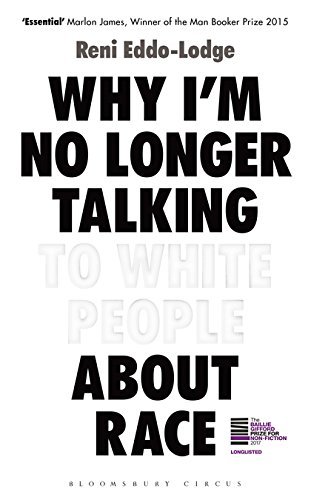Why I’m No Longer Talking to White People About Race

Rating: 4.7/5
Author: Reni Eddo-Lodge
Publisher: Bloomsbury Publishing
Publishing Date: June 2017
Language: English
Genre: Racism, Feminism
ISBN-10: 140887055X
ISBN-13: 978-1408870556
Format: Hardcover
Pages: 272
Cost: Rs. 397 (Paperback), Rs. 1,075 (Hardcover), Rs. 223.30 (Kindle edition)
Plot:
Exploring issues from eradicated black history to the political purpose of white dominance, whitewashed feminism to the inextricable link between class and race, Reni Eddo-Lodge offers a timely and essential new framework for how to see, acknowledge and counter racism. It is a searing, illuminating, absolutely necessary exploration of what it is to be a person of colour in Britain today.
Review:
Reni Eddo-Lodge opens up her provocative and challenging viral blogpost of 2014 into a 224-page book. Eddo-Lodge talks about racism which is one of the biggest problems that Britain is facing. She also talks about anti-immigrant narratives that are cynically used by those in power to divide the working class, and jots down the early insights into whiteness being the ‘default’.
Eddo-Lodge’s concern is not with prejudice, the irrational bias by white people against people of colour. It is with what she calls ‘structural racism’ for which overt racial prejudice is neither a necessary nor sufficient condition. Structural racism is what is left after all the explicit legal; technical and other formal constraints on the developmental possibilities available for people of colour have been largely removed.
She enforces that- structural racism is cultural; it is invisible; and it, not the rules and regulations, has always been the source of the ‘racial problem’ - not only in Britain but throughout that part of the world dominated by European culture.
She asserts that white people hold the power to hire, fire, reward, punish, recognise or ignore black people, these presumptions become racism. The effects of these presumptions are rarely dramatic or even discourteous: “White privilege is dull, grinding complacency.”
She narrates her experience: “The claim to not see race is tantamount to compulsory assimilation. My blackness has been politicised against my will, but I don’t want it wilfully ignored in an effort to instil some sort of precarious, false harmony. And, though many placate themselves with the colour-blindness lie, the... drastic differences in life chances along race lines show that while it might be being preached by our institutions, it’s not being practised.”
“Seeing race is essential to changing the system,” she says. She gets absolute honest about the absence of people of colour on television and in film; the absence of memorials to the victims of slavery; the absence of the history of exploitation of black people by white people in school textbooks and popular history documentaries; the absence of criticism of those white cultural heroes like the founding fathers in America and the pillars of British society who participated in this exploitation.
Milestones of the Book
- Blackwell’s Non-Fiction Book of the Year
- Longlisted for the Baillie Gifford Prize 2017
- Shortlisted for the Books Are My Bag Readers Award
- Selected by Emma Watson as the Our Shared Shelf Book Club Pick for January/February 2018
- Sunday Times Bestseller
- Winner of the British Book Awards Non-Fiction Narrative Book of the Year
- Winner of the Jhalak Prize
About the Author:
Reni Eddo-Lodge is a London-based, award-winning journalist. She has written for the New York Times, the Voice, Daily Telegraph, Guardian, Independent, Stylist, Inside Housing, the Pool, Dazed and Confused, and the New Humanist. She is the winner of an MHP 30 to Watch Award and was chosen as one of the Top 30 Young People in Digital Media by the Guardian in 2014. She has also been listed in Elle’s 100 Inspirational Women list, and The Root’s 30 Black Viral Voices Under 30. She contributed to The Good Immigrant. Why I’m No Longer Talking to White People about Race is her first book. It was chosen as Blackwell’s Non-Fiction Book of the Year, longlisted for the Baillie Gifford Prize and shortlisted for the Books Are My Bag Readers Award for Non-Fiction.















































